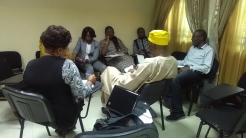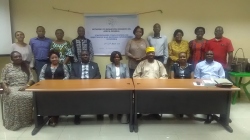
The Stakeholder Consultation on Enhancing Remittance Contributions for National Development was successfully organised by the Network of Migration Research on Africa (NOMRA) with support from FORD Foundation from 24 – 25 July 2017 at Ikeja, Lagos.
The consultation brought together policy experts and representatives from International Labour Organisation [ILO], National Commission for Refugees, Migrants and Internally Displaced Persons [NCFRMI], as well as the Center for Migration Studies [CMS] of the University of Ghana. The conference was also richly graced by members of the academia from the University of Ibadan, Lagos State University and Elizade University as well as representatives from the media.
The two-days consultation was officially declared opened by Professor Aderanti Adepoju, the Founder and Coordinator of NOMRA while the opening address was presented by Professor T.O Fadayomi, the Acting Vice-Chancellor of Elizade University.
According to Professor Fadayomi, “The African diaspora today is facing the rise of extreme nationalist parties throughout Europe and United States under Trump presidency, where most of the African remittances originate. There is a call for tougher migration policies in these countries borne out of the fear of mass migration with negative consequences on jobs and cultural and social harmony.”
He suggested that “African leaders and government should show more interest through their embassies in the condition of work and living of their emigrants, their adjustment challenges and the state of their families and obligations.”
Meanwhile, a Background Paper on “Pathways to Leveraging Remittances for Development in Nigeria: Challenges and Opportunities” was presented by Mrs. Omolara Duke, the Deputy Director, Research Department, CBN while a Policy-oriented Paper on “Leveraging Remittances for Development: Lessons Learnt from Ghana Experience” was presented by Dr. Joseph Teye of the Centre for Migration Studies, University of Ghana.
Other panel presentations at the consultation include:
- Enterprising People and Remittances by Omolola Olarinde [M.Sc, MPhil Econs];
- Enhancing the sustainability of migrants’ remittances to Nigeria by C. Ajaero[PhD];
- Microeconomic Impact Assessment of Remittances on Nigerian Households by Emeka Nzeh [PhD];
- Remittances for Development in Nigeria: Retrospect and Prospect by LEO Abejide [PhD]
Participants also had a breakout on the way forward on the following issues:
- Identification of trend, volumes and future of remittances
- Roles of Government Agencies on remittances
- Roles of Money Transfer Organisations on remittances
- Roles of Communities on remittances
- Roles of Individuals on remittances.
To get materials on the conference proceedings and presentations, contact NOMRA via email on info[at]nomra.org.
Meanwhile, here are some pictures from the consultation:
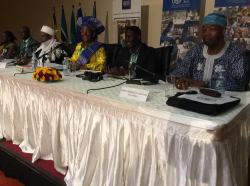
The Network of Migration Research on Africa (NOMRA) was at the Third Pan African Forum on Migration which was held in Kampala, Uganda from 15–17 May, 2017.
The forum which was held at Speke resort Munyonyo, Kampala, is a joint initiative of the African Union Commission [AUC] and the Regional Economic Communities [REC], with the International Organisation on Migration [IOM] as the Technical Secretariat.
The three-day conference which was held under the theme “Towards an African Common Position on the Global Compact on Migration” was organised for participants to share some national and regional perspectives on migration and to make some recommendations as inputs to the Global Compact on Migration [GCM].
The forum brought together senior government officials in Uganda and other relevant stakeholders from all the AU member states and other entities including CSOs, private sector, migrants, diaspora, academia, unions, and non-state actors.
Representing NOMRA at the forum is its Executive Director, Prof. Aderanti Adepoju. At the forum, Prof Adepoju extensively spoke on the topic: “The youth and Irregular Migration: The role of Traditional Leaders and Civil Society (human rights, trafficking in human beings, social inclusion, discrimination, xenophobia and intolerance)”. The session was moderated by Hon. Nanette Thomas, Minister of Political and Public Affairs, Republic of Sierra Leone.
The Kampala forum provides an all-inclusive platform to share migration information, trends, experiences, lessons and good practices. It also presents an opportunity to discuss national and regional perspectives on migration based on the modalities and thematic clusters that have been agreed upon for the intergovernmental negotiations of the global compact for safe, orderly and regular migration.
At the end of the meeting, a Draft Outcome Document would be prepared towards an African common position as a broad consensus on safe, orderly, and regular migration which will be used as input on the Global Compact –to be adopted by the United Nations intergovernmental conference on international migration in 2018.
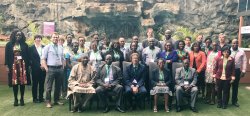
The Network of Migration Research on Africa (NOMRA) recently participated in a consultative workshop to examine the potential of migration for inclusive economic growth.
The workshop which is part of a UK aid-funded project entitled Migration for Inclusive African Growth [MIAG] was held in Nairobi, Kenya from 6th June to 8th June, 2017.
The MIAG network include representatives from the Open University, NOMRA, African Migration and Development Policy Centre [AMADPOC], Eduardo Mondlane University, Mozambique and Centre for Migration Studies at the University of Ghana. The primary contribution of the MIAG network is to gather evidence based information and identify gaps in existing knowledge on migration in Africa. These gaps are either in relation to theory, methodology or practice.
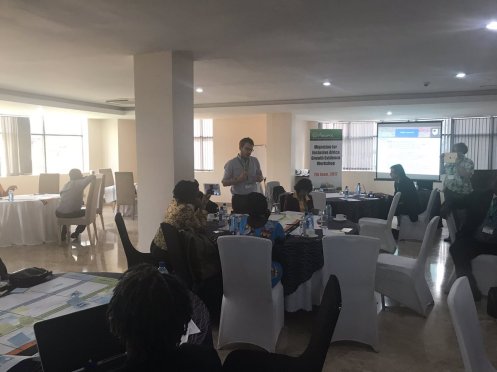
Evidence Cafe: Open University’s Ben Lambert shares ideas on the migrant contributions to development and identifying new project areas.
The Nairobi workshop was hosted by AMADPOC with support from Open University. The MIAG network representatives were joined by Dr Dan Opon from Kenya’s Immigration Department, policy experts, representative from the Kenyan Diaspora and migrants in Kenya.
The consultative workshop witnessed an Evidence Cafe which seeks to shape a greater understanding of the knowledge needs of different stakeholder groups – including Kenyan policy-makers, regional and international policy-makers, migrant entrepreneurs, and researchers – with a view to designing further research that is of direct relevance to these various groups.
From NOMRA’s pan-African network, previous trainings/capacity building and research activities and research outputs, the organisation would bring to bear its experience, lessons learnt on Nigeria, West Africa, as well as other African areas as it can tap on/from the knowledge of members in specific areas of specialisation to robustly promote the agenda of the MIAG.
The MIAG consultation in Kenya will lead to a multi-country study with a replication of Evidence Cafe in Nigeria, Ghana and Mozambique.

Following the interactive and participatory workshop organised in October 2015 for practicing journalists which focused primarily on the National Policy on Migration; the Network of Migration Research on Africa (NOMRA) organised a one—day follow-up training for 14 practicing journalists from fourteen media houses.
The follow-up Training on “Reporting Migration in Support of the Implementation of the National Policy on Migration” engaged practicing journalists who were unable to attend the first (two-day) workshop and critically assess the extent to which migration reportage has been enhanced in the intervening period.
Discussion ranged from Challenges and Opportunities for Enhanced Reporting on Migration Issues: Data, Retrieval, Dissemination, Funding, sustaining the Momentum of the transition to linking the National Migration Policy Plan of Action and Valletta Summit Action Plan.
Journalists were adequately equipped on how to go about reporting migration issues as well as the best international practices on covering and reporting migration. Participants were also advised on how to effectively link the National Migration Policy plan of action to the Valletta summit action plan as well as the challenges and opportunities in reporting on migration. Journalists also deliberated extensively on story ideas that could be covered in migration reporting.
Nevertheless, some of the key decisions taken by participants at the end of the training workshop for creating a better platform for reporting on migration (in support of the implementation of the national policy on migration) are as follows:
- That there is indeed an urgent need to put in more effort to report issues of migration correctly and enhance scope of migration reportage networks.
- That there is need for media houses to have a specialised desk for migration reporting.
- That there is increased need for media role in accurate and timely reportage of migration issues. As a result, there is need for more evidence-based reporting on migration matters.
- That media houses should prioritise migration reporting.
- That there is need for the media to urge the government to make more commitments on migration issues.

As media professionals in no small measure are believed to shape public opinion by their editorials and stories, the Network of Migration Research on Africa (NOMRA) in collaboration with the National Commission for Refugees, Migrants and Internally Displaced Persons (NCFRMI) organised a training for Journalists and Editors of various to equip them with practical skills to report on migration adequately and accurately. This will help to promote public debate on migration issues, and providing support for co-operation and exchange of quality information among journalists and media organizations, and ultimately the public especially to promote regular migration and discourage irregular migration.
The training which enjoyed technical support from the International Organization for Migration (IOM) was held from 21 – 23 October, 2015 in Lagos, Nigeria within the framework of the national 10th European Development Fund project “Promoting Better Management of Migration in Nigeria”.
The interactive and participatory workshop organized for practicing journalists focused on the National Policy on Migration; the new orientation of the management and governance of migration; reporting on migration with emphasis on migration configurations and data sources; an overview of leading contemporary migration-development issues; migration and national security; human rights of migrants, irregular migration and human trafficking; and the role of journalists in public enlightenment.
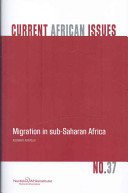
Author: Aderanti Adepoju
Editor: Nordiska Afrikainstitutet
Language: English
Page: 70
Publication Year: 2008
Publisher: Stylus Pub LLC
ISBN: 9171066209, 9789171066206
Africans arriving by rickety fishing boats to the Canary Islands, risking the passage across the Straits of Gibraltar or washing up on the Italian island of Lampedusa are familiar examples of the recent growth in migration from Africa to Europe. There is this dark side of migration in human trafficking, but the picture of a continent on the move also includes highly skilled professionals from Nigeria and Ghana who seek employment in universities and other professions in South Africa. On the positive side, migrant remittances are a major source of income in many sub-Saharan African countries, helping to sustain the lives of poor home communities. A major challenge now facing sub-Saharan Africa is how to attract skilled emigrants back for national development.
To get a copy of the book, contact NOMRA
Phone: 234 (0) 8023061845; (0)8034881727; (0)702861966
Email: info@nomra.org, nomra7@googlemail.com
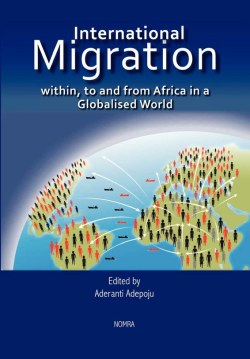
Language: English
Page: 264
Publication Year: 2009
Publisher: Sub-Saharan Publishers, Ghana
Edited by: Aderanti Adepoju
ISBN: 9789988647421
International Migration within, to and from Africa in a Globalised World addresses the main issues concerning international migration from an African perspective. This timely book encompasses migration as a global phenomenon and considers African migration in all of its dimensions: within, from and to Africa.
The book also addresses the very important 21st century political issue of migration management in regional perspectives and considers the crucial issue of the brain drain along with the role of the diaspora and remittances.
Professor Aderanti ADEPOJU spent several years researching issues of migration – internal and international migration – in Africa while at the Universities of Ife and Lagos in Nigeria and while working for the ILO, UN and UNFPA. He is currently Chief Executive, Human Resources Development Centre, Lagos, Nigeria and Co-ordinator of the Network of Migration Research on Africa.
To get a copy of the book, contact NOMRA
Phone: 234 (0) 8023061845; (0)8034881727; (0)702861966
Email: info@nomra.org, nomra7@googlemail.com

Language: English
Page: 580
Publication Year: 2012
Publisher: Safari Books, Nigeria
Edited by: John O. Oucho
ISBN: 9789788431169
Fifteen chapters are included here in this compendium in honour of the Nigerian migration scholar Professor Aderanti Adepoju. Though the authors come from diverse disciplinary backgrounds: geography, demography, sociology and law; they all work within the fields of internal and international migration in Africa.
Chapters on Uganda, Kenya, Botswana, Nigeria and Mali are devoted to aspects of internal migration, while those on African emigration to Mexico and migration between Burkina Faso and Côte d’Ivoire address various aspects of international migration. Migration issues in relation to women, students and climate change are also discussed.
To get a copy of the book, contact NOMRA
Phone: 234 (0) 8023061845; (0)8034881727; (0)702861966
Email: info@nomra.org, nomra7@googlemail.com

Book Title: International Migration and National Development in Sub-Saharan Africa : Viewpoints and Policy Initiatives in the Countries of Origin
Language: English
Publication Date: 15 Dec 2007
Publisher: Brill
Edited by: Aderanti Adepoju , Ton Van Naerssen and Annelies Zoomers
This book focuses on achieving a better understanding of the implications of international migration for national development from the perspective of the sending countries (with an emphasis on sub-Saharan Africa).
More specifically, the purpose of this volume is to explore:
- Current perceptions – as seen from the perspective of the countries of origin – of the links between international migration and national development.
- Current trends in policy making aimed at minimising the negative effects, while optimising the development impact.
Interested? Contact NOMRA
Phone: 234 (0) 8023061845; (0)8034881727; (0)702861966
Email: info@nomra.org, nomra7@googlemail.com


